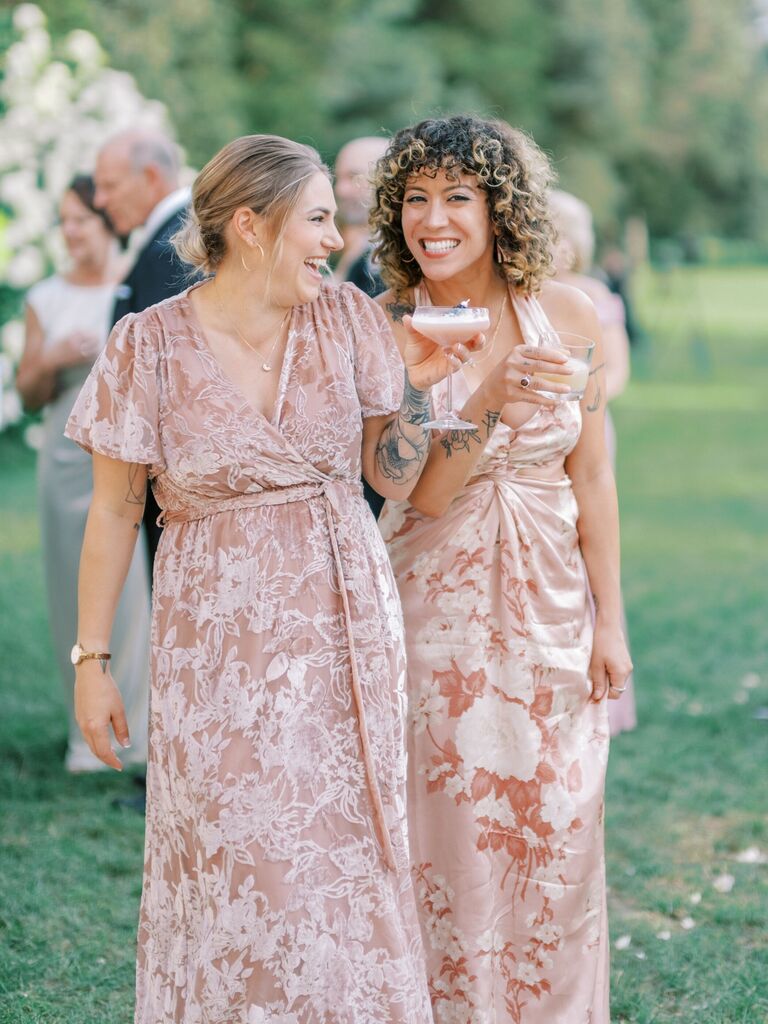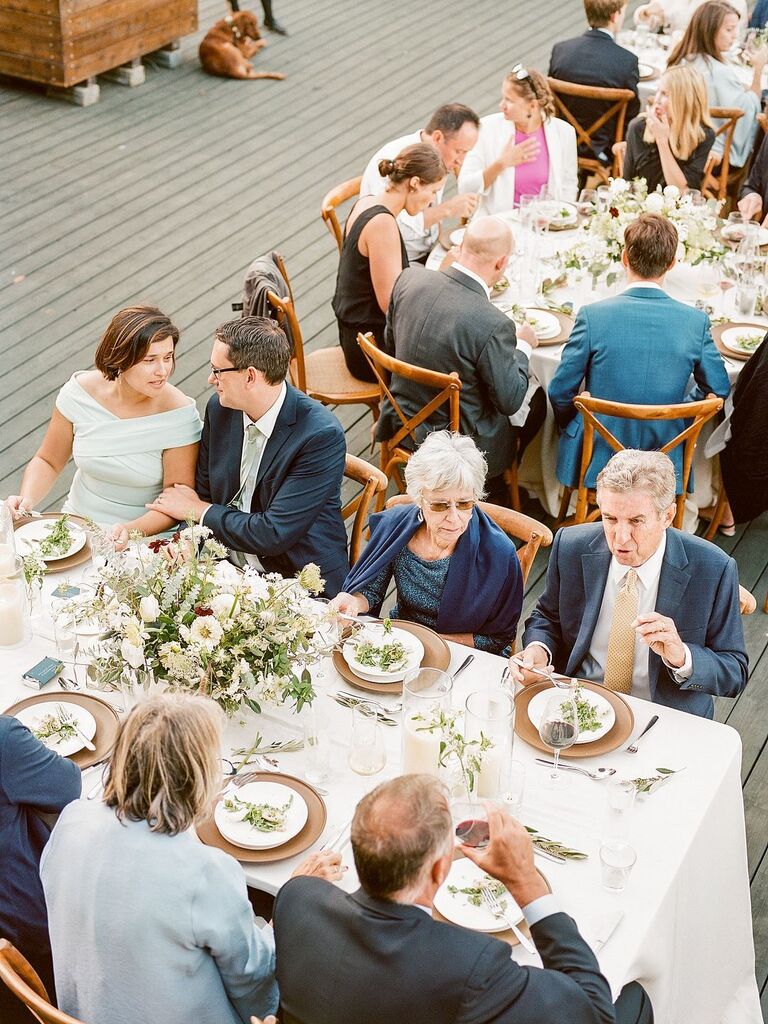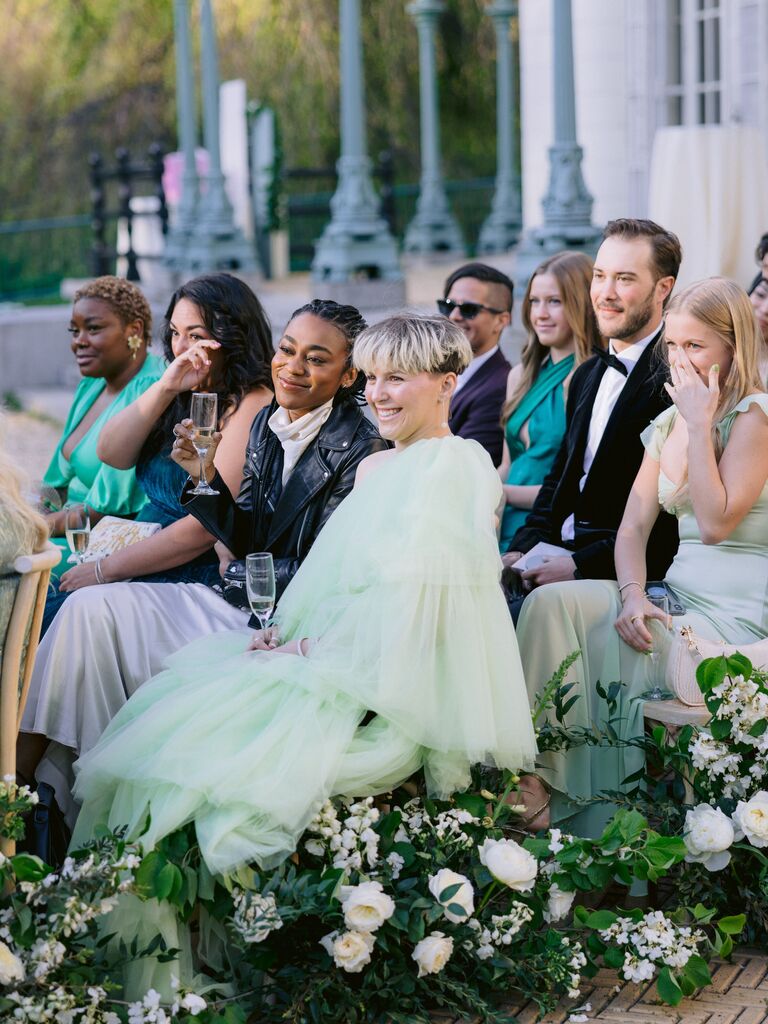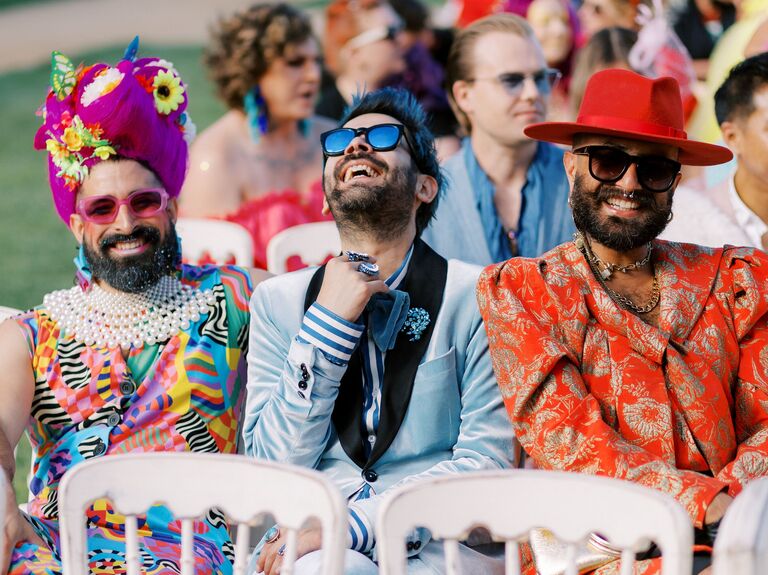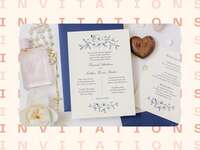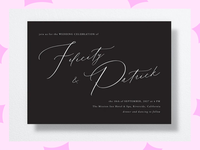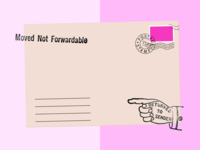All the Wedding Plus-One Etiquette Couples Should Know
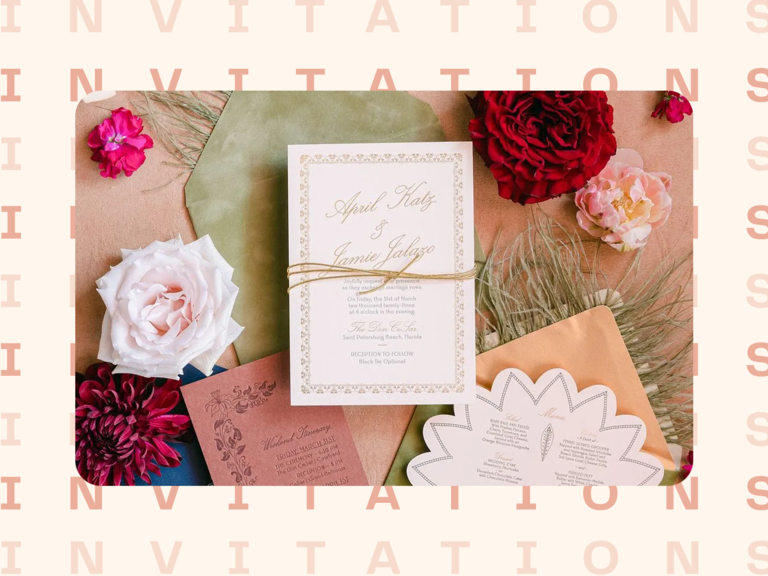
We understand the stress and nuances of planning a beautiful wedding day within your budget. One of the first steps in achieving this goal is figuring out who to invite to your wedding, which includes who gets a wedding plus-one. But what's the best way to tackle this delicate hot topic? That's where we come in. Read the following plus-one etiquette rules, approved by industry experts, so everyone can have a wonderful time during your celebration. From breaking down what a plus-one is to providing plus-one invitation wording, we've got you covered.
Wedding plus-one etiquette 101: What Is a Plus-One? | Does Everyone Get a Plus-One? | Who Gets a Plus-One? | Who Doesn't Get a Plus-One? | Wedding Website Wording | Wedding Invitation Wording | Tips
What Is a Plus-One?
"The 'plus-one' meaning is when you allow your invitee to bring an additional guest of their choosing. On a wedding invitation, this is designated as 'and guest.' For example, the envelope might read: 'Mr. James R. Smith and guest,'" says Emily Coyne, founder of Emily Coyne Events and passionate wedding and event planner with over a decade of experience. While a plus-one usually refers to a date or a romantic interest, it could also include a family member escorting an older guest who may need assistance or a close friend attending with a single person.
Does Everyone Get a Plus-One at a Wedding?
It depends. If you have an unlimited budget and your wedding venue has ample space, you could offer every unattached guest a plus-one. However, for most couples, budget and space are limited, so giving every guest a plus-one isn't an option.Who Gets a Plus-One at a Wedding?
Irene Katzias, founder and lead planner of Irene + Co Events with numerous awards in event design, says the plus-one conversation isn't as cut and dry as you think and is impacted by different factors like the couple's budget, their venue capacity and the number of people they'd like present during their wedding day. "As you might imagine, it's up to every couple's unique discretion. When giving out the plus-one option, ask yourself, 'How does this affect the social dynamics of the evening and the seating chart I've planned?'" Keep that in mind and see the people that are typically allowed a wedding plus-one, below.

The Wedding Party
"Since this is such a delicate and personal choice, I highly recommend establishing your own 'rules' and showing consistency. For example, if one person in the wedding party is offered a plus-one, every single person in the wedding party should be offered the same thing. This eliminates any favoritism, which is never in style," Coyne explains. It's important to remember your wedding party has not only given you their time, love and energy, but they've also spent a lot of money on attire, lodging and transportation, for multiple events. Trust us on this one—they deserve a plus-one.
Anyone Who's Married
It's best to invite both parties in a married couple, even if you're closer to one person than the other, or never met someone's spouse. Also, any couples who are engaged, live together or have been dating for over a year should get a plus-one. In this day and age, lots of couples live together before they get married or never get married at all so acknowledging their commitment is the right thing to do. While you can use your judgment with couples who've been dating long-term—say, your 16-year-old cousin and his girlfriend—you and your partner should be able to tell if it's a serious relationship. If not, err on the side of caution and give them a plus-one.
Close Friends
"I typically suggest granting the couple's closest friends the option to have a plus-one if their partner or spouse isn't involved in the wedding already. Your closest people should all have a 'buddy,' or rather, the opportunity to have someone they can experience the night with," Katzias says.
Close Family Members
Katzias believes family plus-ones should be on a case-by-case basis. "It's likely you'll have lots of your family members at your wedding, the need for a built-in buddy sort of dissipates–they should have plenty of people they know and like at the wedding," Katzias says.
Who Doesn't Get a Plus-One at a Wedding?
Who gets a wedding plus-one is up to your discretion, but there are some people who usually don't get one. Sit down with your partner and discuss if these three groups below need a plus-one for your affair.
Guests Who Are Casually Dating
If the invited guest in question seems to have a new significant other every few months or hasn't been dating the same person for more than a year, giving them a plus-one isn't a priority. If you have the budget to do so, a last-minute plus-one is allowed. " It's advisable to not grant ambiguous plus-ones on the save-the-date, and instead only include the name of the single guests. You can decide later if you want to let them bring a guest when you send invitations if they've entered a serious relationship by that time," Coyne says.
Coworkers
Coworkers can be tricky, even without the issue of plus-ones. But to keep it simple and stress-free, whether you're inviting your work besties or feel obligated to include your entire team, if one person gets a plus-one, everyone else should get one too.
Single Guests Who'll Know Other Guests
If your mother insists your cousin Olivia needs an invitation even though you haven't seen her in 10 years, you don't have to give her a plus-one if she's not married or in a long-term relationship. Deal with this based on each individual's situation, then carefully consider where to seat them at the wedding.
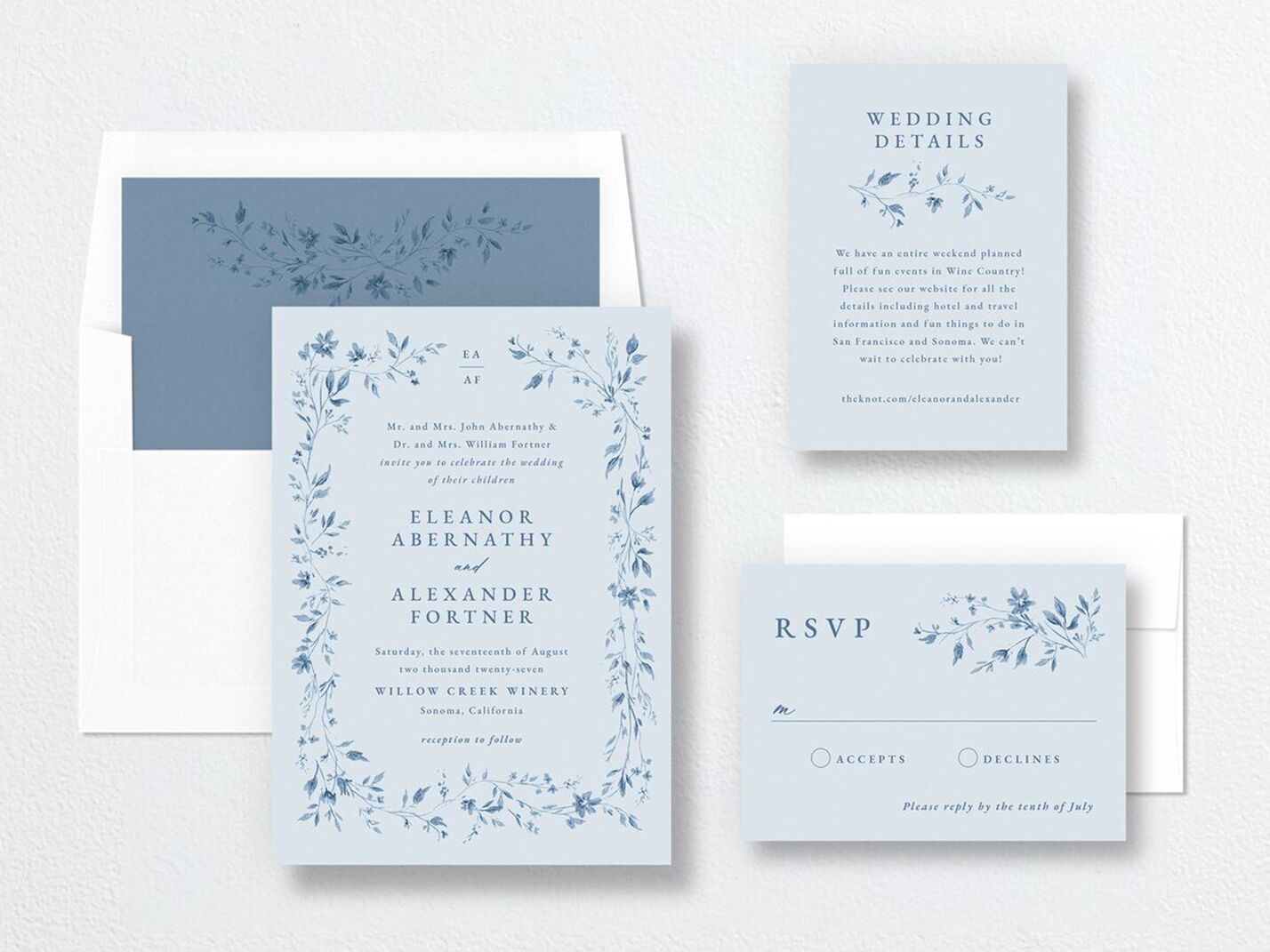


Wedding Website Plus-One Wording
On your wedding website's FAQ section, you must acknowledge everything you think guests will ask. Keep reading to see how to answer the plus-one question on your wedding website in the most polite and gentle way possible.
- Yes, you can bring a plus-one to our wedding. We can't wait to celebrate with both of you soon!
- If "and guest" or your plus-one's name is written on your wedding invitation, you can bring someone. See you and your plus-one on [insert wedding date]!
How to Say No Plus-Ones on Your Wedding Website
Use your wedding website as a one-stop shop for all your guests' burning questions. If you aren't doing plus-ones at your wedding, this is what you and your partner should say.
- Because of limited venue space, we unfortunately can't accommodate plus-ones beyond those named on the wedding invitation. We hope you understand our decision.
- Since we want to keep our wedding as intimate as possible, we're only inviting our closest loved ones. We look forward to seeing you soon!
Wedding Invitation Plus-One Wording
Want to know how to address wedding invitations for plus-one? On the outer envelope, write the guest's name and their plus-one's name if you have that information. If not, write the guest's name on the outer envelope and inner envelope then add "and Guest" to the inner part as well. Examples of this wedding invitation wording are written below.
- Outer Envelope With Plus-One's Name: Mrs. Valerie Smith and Mrs. Hannah Woods
- Outer Envelope Without Plus-One's Name: Mrs. Valerie Smith
- Inner Envelope: Mrs. Valerie Smith & Guest
- RSVP Card: You are invited to bring one guest.
- RSVP Card: You are invited to bring a plus-one.
How to Politely Say No Plus-Ones on Wedding Invitation
Coyne believes this a sensitive subject that shouldn't be written on the wedding invitations. "It's rude to state this and essentially says to your guests 'We don't think you know proper etiquette so we're going to spell it out for you.' Instead, hold yourself to a higher standard, use proper etiquette in addressing your invitations, and handle the questions that arise privately and on an individual basis," Coyne suggests. Katzias says one of the clearest and most polite ways to say no plus-ones at your wedding is to say your celebration is "by invitation only" on your wedding website.
Additional Wedding Plus-One Etiquette Tips
You might be surprised but there's more wedding plus-one advice we need to give you. Here are five more things you should know before sending your invitations.
Have Grace When Dealing With Guests Asking for a Plus-One
Coyne suggests couples be polite and consistent when faced with guests asking for plus-ones. "There's never a reason to make anyone feel bad but the person who asked for a plus-one is in the wrong here," Coyne says. Katzias thinks couples should look at each request individually and consider logistical factors like budget, the venue capacity, the venue's rules and more. "You'll need to consider all of these, plus determine how that plus-one might affect the environment of your wedding day," Katzias says.
Want to know how to answer, "Can I bring a plus-one?" Katzias encourages to-be-weds to use something along these lines: "Let me check with my planner and see what our venue allows." This gives you time to speak with your partner and planner to determine your final decision. If you stay consistent, Coyne suggests saying, "We wish we could allow everyone to bring a plus-one, but as we faced some limitations in being able to do this, we were only able to allow wedding party members to bring a guest."
Decide If the "No Ring, No Bring" Rule Is Right for You
Katzias and Coyne both agree that the "no ring, no bring" rule isn't proper etiquette or the best way to determine who gets a plus-one for a wedding. "If anyone is in a serious relationship (married or not), I think they should be considered for a plus-one if the venue, capacity and your budget allow. Consider your guests' current relationship statuses so you can keep the atmosphere as intentional, comfortable and positive as possible," Katzias urges.
Ensure You Know Every Plus-One's Name
Play detective and know the name of every plus-one so you can have it written and spelled correctly on the save-the-date, invitation and escort card. Even if you have to fall down an Instagram rabbit hole or make a call, it's 100% worth it, and the polite thing to do. By the way, "some couples refer to plus-ones when they're talking about the significant other of someone on the guest list, but technically, this isn't a plus-one. If one of your invitees is in a serious relationship and your goal is to include that person, then their name should be used and become a full-fledged part of the guest list," Coyne adds.
Order Extra Wedding Invitations
If you think you might be sending a second set of invitations for last-minute plus-ones, prepare for it ahead of time. Not only will it make the process smoother, but it'll save you some serious cash since buying wedding invitations in small batches is much more expensive than ordering them in a single shipment.
Think Hard Before Making an A and B Guest List
Coyne acknowledges that A and B guest lists are a common practice, but doesn't approve of them. "Inevitably, B list guests find out they were on the B list, which is in very poor taste to divulge. Instead, we recommend deciding early what your priorities are for the guest list vs. the wedding vision and then sticking to that decision." Katzias feels differently about A and B guest lists. "If couples are planning their weddings anywhere from nine months to one year in advance, I encourage (and highly recommend) an A and B guest list. On the A side are mandatory invites as in people you couldn't imagine not being there on your wedding day. On the B side are the guests you want at your wedding but may or may not be able to accommodate based on your budget or your venue." If putting your guest list in two categories sounds like the best for your situation, Katzias says your list of "A" people should get an early RSVP date. "Once that date has passed, and you've followed up with every person on the A list, you can send the B list invitation with a new RSVP date," Katzias advises.

